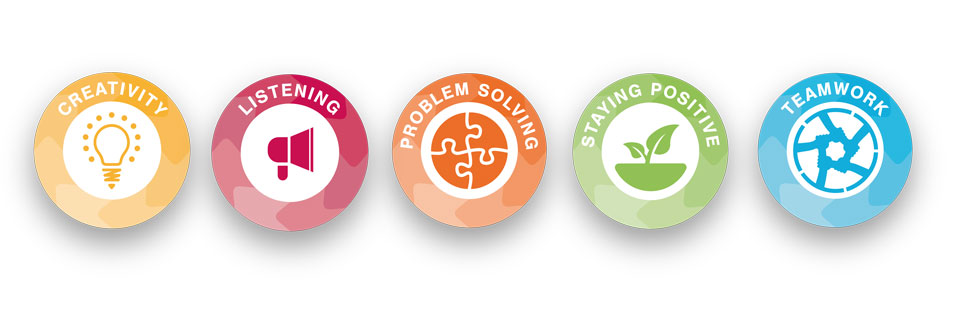Emotional Intelligence is the ability to understand and manage our own emotions and the emotions of others. Its development is distinct from the development of academic intelligence and a child can benefit from the positive impact on success and wellbeing that it can provide. A child experiencing some of the less helpful characteristics common in high learning potential children, such as the tendency towards perfectionism, social challenges, or worry and anxiety, could benefit greatly from the mitigating effect of the development of their emotional intelligence. In our blog Emotional Intelligence and High Learning Potential we looked at what emotional intelligence is and its impact on children with high learning potential. In this article we look in more detail at the five key skill areas identified as constituting emotional intelligence by psychologist Dr Daniel Goleman:
- Self-awareness: the ability to recognise your own emotions (and how they affect not just yourself but others around you).
- Self-regulation: the ability to remain in control of your actions, whatever emotions you may be feeling.
- Motivation: the ability to persevere in your pursuits, even in the face of difficulties.
- Empathy: the ability to understand and respond to the emotions of others.
- Social skills: the ability to use emotional intelligence in the context of interpersonal relationships.
Self-Awareness
Being able to understand their emotions: what they are, why they are experiencing them and then what to do in response to them, goes a long way in building up emotional intelligence. You can help your child by discussing your own emotions; by modelling emotionally intelligent behaviour, showing them that it is okay to have all different kinds of emotions and that we can respond to them in a positive manner.
Talk to them about how you feel; about how they feel, and about both the big and the small emotions, in order to take the fear of the unknown out of the equation. This can be of immense help to a child who may previously have found it difficult to discuss their feelings. Modelling behaviour in this way can show them that the world does not end when we admit to our emotions; that, in fact, it becomes a whole lot easier to navigate once we do not fear our feelings. Validate their own emotions, and their intensity, and make such discussions so regular that the whole process becomes comfortable, normalised, almost automatic, and certainly significantly less scary.
If they are not comfortable vocalising their emotions, allow them to write them down or draw them. Perhaps make up some emotion cards so that your child can pick out the ones that they are feeling at that moment, or ask them: “If you were an animal, what would you be?”. Helping them to develop the confidence and the vocabulary to recognise, name and describe their emotions will help them to feel more in control, and they can begin to take ownership of them. From that point, they will be much more able to go on to choose appropriate ways forward. For more support in helping them to develop their emotional literacy, see our advice sheet PA616 Describing Feelings
It is also only with the development of such self-awareness that a child can go on to develop another of the key skills of emotional intelligence: empathy. From the stepping stone of being able to recognise their own emotions they will be able to move on to identifying the emotions of others.
Other ways to encourage self-awareness:
- Encourage imaginative role play
- Read books together with emotional storylines that can be discussed
- Make different facial expressions together in the mirror: name the emotions that are being conveyed
- Recognise moods both at home and when out and about and how they change in different situations. Discuss what mood they feel different places have, and why.
Self-Regulation
Being, in essence, the idea of thinking before acting, self-regulation is an important but tough area of emotional intelligence, especially for many children with high learning potential who may feel extremely intense emotions that can be a lot more difficult to corral. However, learning how to respond rather than to react, especially when those emotions are highly intense, has the potential to be transformative: the sense of agency, of control that may result, can work wonders on self-esteem and wellbeing.
Validating the intensity of a young person’s emotions is an important step in supporting them in this area, as is modelling self-regulative behaviour yourself. Discuss how you feel; when you are frustrated, when something hasn’t gone right etc. Then show how you can respond positively to the emotion rather than allow the emotion to control you. Modelling positive responses may not always be easy, but nonetheless, it is important. The key is not to deny that we have emotions, good and bad, or that we have both successes and failures, but to discuss them calmly and confidently, without fear or shame (thus addressing the high potential learners tendency towards perfectionism, too) and always with a view to regarding them as useful feedback that can inform a positive and proactive response. With this proactive response, unhampered by negative and reactive feelings, vastly more productive strategies can be implemented. It can also help a child to view without fear and with so much more clarity, where their strengths and weaknesses lie. From there, they will be significantly more able to proceed effectively. Removing that blind panic of frustration and anger through emotional self-regulation allows space for more effective strategies to be put in place, thereby improving the chances of much more successful outcomes.
Motivation
Addressing the tendencies of children with high learning potential towards perfectionism and a fear of failure, and removing the stultification this can cause, can help greatly in boosting motivation. Helping them to develop a growth mindset by praising hard work and effort, as opposed to the end result, can help them to build this resilience. This goes a long way towards helping a child to cope with the emotions surrounding difficulties, setbacks and failures, and ultimately remain motivated moving towards a goal, whether the path towards it is smooth or bumpy.
Participating in learning new skills or exploring brand new activities with your child can also be of great help, especially those that are outside of your own comfort zone, affording many a glorious opportunity to model being utterly fabulous at failure! Showing them that it is merely feedback that informs how to move on from that point, is a valuable lesson in emotional intelligence and will increase the chances of a child remaining motivated and “on task”, however tricky that task may be.
Board games can also be excellent for supporting the development of a growth mindset and thus increasing a child’s motivation. There are ample opportunities for parents to model, even to the most vehement opponent of failure, how to lose gracefully, how to enjoy the process rather than just the end result, and to help them develop the social skills of cooperation and sportsmanship, too. Please see our blog, Developing Thinking Skills Through Board Games, for lots of great advice on board games.
Empathy
Much like with self-awareness, the best way to help a child to develop their sense of empathy is to talk. A lot. Discuss your own emotions, make space for them to discuss theirs (revisit our advice sheet, PA616 Describing Feelings if needed), and talk about how others might be feeling, and why, too. All of this will help them to recognise the emotions of others and thus be much more able to respond accordingly.
Providing opportunities to help others can also be of great use in the development of empathy. Support them in collecting food for the local foodbank; discuss with them other ways in which they might be able to help people. All such activities will help to further develop their sense of empathy.
Some children with high learning potential, especially those with emotional overexcitability, may have almost an excess of empathy. A child with high learning potential and with emotional overexcitability may actually need help in scaling back their empathy for their own wellbeing. Whilst helping others may remain perfectly appropriate as a positive and proactive response to those feelings of helplessness or despair in the face of extreme concern for others, an equally important element of support that a child may need, is to develop self-awareness that allows them to recognise when to step back a little, from consideration of other people’s feelings and when it is clear that it is having a negative impact on their own wellbeing.
Talk to them, discuss the importance of self-care (and be sure to also model it); support them to devise their own self-care strategies, perhaps by having a calm reading corner to go to, exercise, mindfulness, yoga, classical music or a cuddle with their favourite teddy bear (or all of the above!). Help them to find ways to step back (and relax) when their empathy looks set to overwhelm them.
Social Skills
Even accounting for the possible difficulties that may be created by both differences to their peers and asynchronous development, there are many ways to help a child with high learning potential to develop their social skills. Provide them with opportunities for social interactions with those more like them; helping them to find their “tribe” can greatly help their social skills. Look into meet ups with other high potential learners via our Facebook group, Parenting High Potential, and keep an eye out for other events (national or regional Explorer groups) throughout the year, whether physical or virtual. Not only can this provide those easier interactions, but it can also go some way into providing the perspective needed to help defeat the ills of perfectionism, which can erroneously link their cognitive ability with what is expected of them regarding social skills. To find others like themselves, with their own versions of wonderfully asynchronous development, may free a child from the worst of the stultifying pressure that comes from assuming that, because their cognitive ability may sometimes be at the level of an adult, that they must also demonstrate the social ability of a grown-up, too.
It is clear that emotional intelligence can be of immense benefit to children with high learning potential, both in general and for reasons specific to their high learning potential. It is also true that there can be some barriers to their development of these skills. The best way to support a child or young person with high learning potential in this area is to, first and foremost, recognise these issues, and to then support accordingly. Whatever stage they are at; however difficult or easy they find the development of their emotional intelligence, they can be supported to develop skills that will have a positive effect on their wellbeing, both now and in the future.

Resources
Arora, M. 14 tips to develop emotional intelligence (EQ) in children. (2018) Parenting First Cry. https://parenting.firstcry.com/articles/emotional-intelligenceeq-in-children-importance-and-tips-to-develop/
Conway, S. How to build emotional intelligence in kids. (2019). Mindfullittleminds.com https://www.mindfullittleminds.com/developing-childrens-emotional-intelligence/
How to build emotional intelligence in children: 17 tips. (2017) Itspsychology.com https://itspsychology.com/emotional-intelligence-in-children/
MacCann, C. Why you need emotional intelligence to succeed at school (2020) https://www.psychologytoday.com/us/blog/dealing-emotions/202006/why-you-need-emotional-intelligence-succeed-school
Mayer, J. D., Perkins, D. M., Caruso, D. R., Salove, P. Emotional Intelligence and Giftedness.(2001). Roeper Review, 23(3), 131-137. https://positivedisintegration.com/Mayer2001.pdf
Partridge, A. (2017) How to build emotional intelligence in your child https://www.huffpost.com/entry/how-to-build-emotional-intelligence-in-your-child_b_7578640
Rosen, P. Emotional intelligence: What it means for kids. (n.d.) Understood.org. https://www.understood.org/en/friends-feelings/empowering-your-child/building-on-strengths/the-importance-of-emotional-intelligence-for-kids-with-learning-and-thinking-differences
Rosen, P. Emotional intelligence in gifted and talented children.(n.d.). Understood.org. https://www.teachingexpertise.com/articles/emotional-intelligence-in-gifted-and-talented-children/
Rosen, P. 6 tips for helping your child build emotional intelligence. (n.d.). Understood.org. https://www.understood.org/en/friends-feelings/empowering-your-child/building-on-strengths/6-tips-for-helping-your-child-build-emotional-intelligence
About the author: Caroline Hooton-Picard is an adviser for Potential Plus UK. She has a background in mental health, having worked for Suffolk Mind and also in private practice, and has a first class degree in Philosophy from the University of Essex. She also has a High Learning Potential daughter who keeps her very much on her toes!






